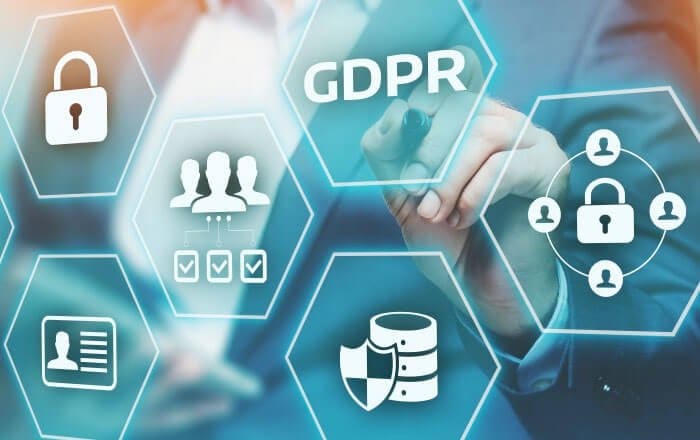In recent years, data breaches and changing data regulations have made headlines across the globe. Most pertinently, the Facebook-Cambridge Analytica scandal demonstrates the clear and present dangers of data use without regulations. In this case, more than fifty million profiles on Facebook were allegedly used to influence US elections in 2016. This sparked a worldwide concern for sharing personal data in exchange for free services. As a result, officials called for data protection laws to be strictly reviewed and GDPR was introduced for businesses.
When did GDPR change for UK businesses?
The EU GDPR, introduced in May 2018, replaced the Data Protection Directive of 1995 and applies to all citizens in the European Union. This meant that despite Brexit, GDPR laws still applied to UK businesses until the process was finalised.
Essentially, the UK General Data Protection Regulation (GDPR) is an amendable version of the EU’s GDPR. Coming into effect from January 2021, the UK GDPR seeks to give the data controlling power back to citizens while guarding their right to privacy.
Stringent global data protection rules
The changes in GDPR for the EU and the UK has now caused a domino effect worldwide. According to UN reports, currently 71% of countries have data protection legislation implemented. In fact, many countries have recently updated their data protection laws or are looking to revise them:
- Nigeria replaced their previous Data Protection Regulation with the Data Protection Act 2023. This has brought the country closer to international data laws and more compatible with GDPR.
- Argentina recently brought forward a new bill relating to personal data and privacy. This year they are looking to further discuss the amendment of their current legislation – the Personal Data Protection Act.
- Australia is working on amending The Privacy Act 1988, having added measures related to protecting digital privacy in 2022.
Implications of UK GDPR for businesses
The UK GDPR applies to all businesses within the UK, as well as businesses outside who offer goods and services to people in the UK. Here we cover some of the main implications for businesses liable under GDPR:
‘Processors’ and ‘controllers’
UK GDPR separates regulations into two key organisational categories:
- Controllers: “the natural or legal person, public authority, agency or other body which, alone or jointly with others, determines the purposes and means of the processing of personal data.”
- Processors: “a natural or legal person, public authority, agency or other body which processes personal data on behalf of the controller.”
Essentially, controllers are required to comply with the GDPR regulations in terms of why and how the data is used while the processor carries out data processing. Any profit-oriented business could be the controller of data. Meanwhile, the processor could be a firm which works alongside the controller, such as an IT support provider.
The responsibility to ensure that the processor complies with the laws related to data lies with the controller. Processors are also required to maintain records to document their activities. In the case of a data breach, the processors are liable to a larger extent under the new GDPR compared to the previous Data Protection regulations.
Changes to definitions
The definition of data also has undergone expansion under the GDPR. Most significantly, the definition of personal data is now more defined as “any information relating to an identified or identifiable natural person”. This includes more digitally inclusive identifiers such as IP addresses and other online identification under personal data.
Moreover, the processing of personal data is now more specific to automated means. This part of GDPR refers to businesses’ responsibilities in storing and securing personal data on electronic systems.
Pseudonymised data as well as data related to health, economic, mental, cultural information are also categorised as personal data.
Rights of the individual under UK GDPR
GDPR mandates transparency at all levels of data handling, starting from its collection, how it is used, stored or the intended purpose. This allows individuals giving up personal information certain rights:
- An individual has the right to seek information about the personal data they have given to a company.
- Individuals are allowed to ask the company why the data is being collected, processed, and who else has access to the personal data.
- Data controllers are required to provide an explanation in clear and simple language on all matters related to data collection and processing.
- Individuals also have the right to “be forgotten”. This means they can ask for deletion of data when the purpose of data collection has been achieved.
Seek best practices for data handling
As many of the GDPR laws related to data are now stricter, ensuring you are equipped with best practices is essential. And for many businesses in various industries, the implications of GDPR mean a huge shift to prioritising data handling.
Not only is safe data handling important for regulatory reasons, but it’s beneficial to your business-customer relationship. This way you’ll cultivate an environment of trust and respect with and for your customers.
Although it requires close attention, consulting with an expert will help maintain best practices in data storage and handling. Protocols and documentation can also increase efficiency of operations, reduce costs and help protect data against cyberattacks.
So, consult with a London based IT support service to learn more about how to stay safe and compliant with customer data.
